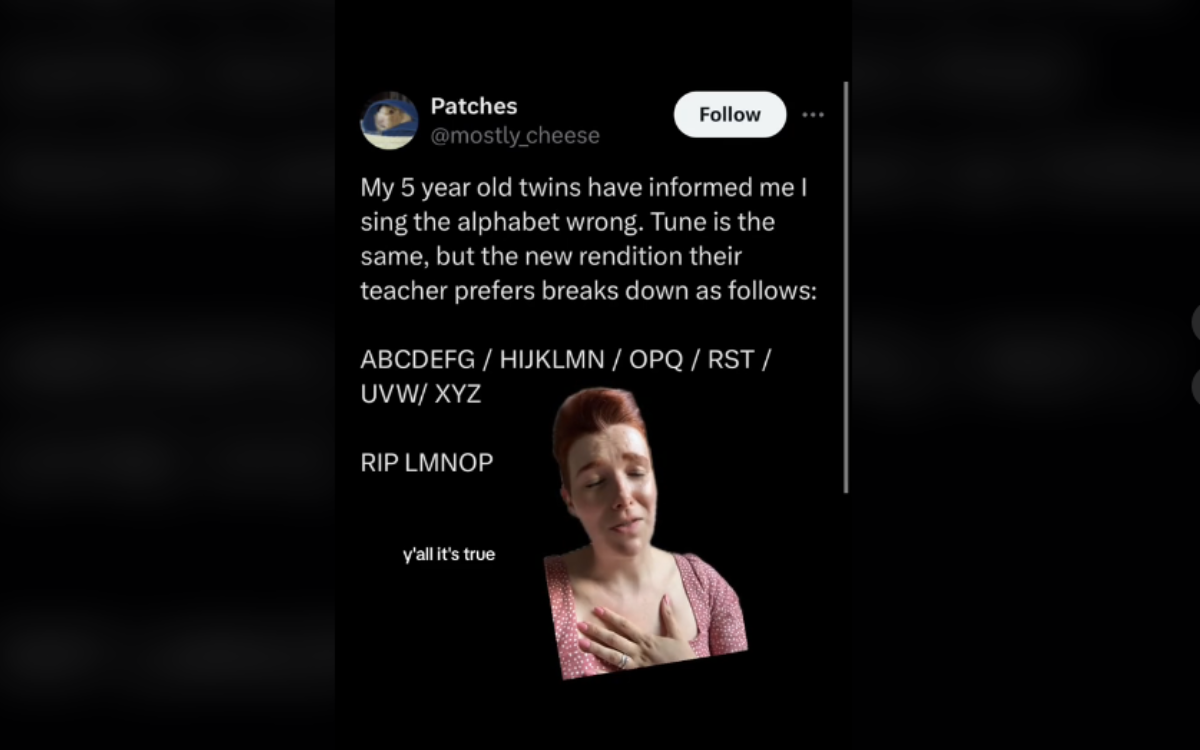An elementary school teacher has confirmed schools are teaching a different version of the “Alphabet Song” and why they are doing it.
Alphabet knowledge and the understanding of letter forms, names and corresponding sounds represents the crucial foundation blocks of emergent literacy in children.
A 2004 longitudinal comparative analysis published in the Journal of Educational Psychology highlighted how a child’s knowledge of these letter names and sounds serves as an accurate predictor of their later reading and spelling abilities.
That’s what makes something like the “Alphabet Song,” sung to the familiar tune of “Twinkle, Twinkle Little Star,” such an important tool in starting to develop those skills and understanding. Rachel, an elementary school teacher from Atlanta, Georgia, who posts TikToks under the handle teacherrachelsorsel, is a keen advocate of the song’s use in her classroom.
Rachel, who asked that her surname not be included, told Newsweek: “When kids are first learning to read, they haven’t yet developed the ‘alphabetic principle,’ which is understanding that those squiggles we call letters each have different names and spell sounds. Songs make learning ‘sticky,’ so the alphabet song is a helpful way to introduce, learn, and practice the beginnings of this concept.”
Now in her fifth year as a first grade teacher, Rachel specializes in structured literacy, literacy intervention, and dyslexia so, when she saw a tweet doing the rounds explaining that the way kids sing the “Alphabet Song” had changed, she was perfectly placed to explain exactly why in a video posted to her TikTok account.
The original post, shared by a user writing under the handle mostly_cheese, read:
“My 5-year-old twins have informed me I sing the alphabet wrong. Tune is the same, but the new rendition their teacher prefers breaks down as follows:
ABCDEFG / HIJKLMN / OPQ / RST / UVW / XYZ.”
According to Rachel, this change has actually been in place for some time now and has been done for a very important set of reasons.
“One of the first assessments I do when I work with a struggling reader is to have them write the alphabet for me,” she said. “So many of them sing the song to help them get through all of the letters, and let me tell you the amount of kids that get so stumped when they hit ‘LMNOP’ is baffling.”
Rachel noted many kids also struggle with letters at the end of the alphabet because of the “and” between y and z in the traditional song and that represents a fundamental flaw in the old version of the song.
“If students aren’t hearing all of the letter names, there is something missing conceptually,” she said.
When Rachel attempted to explain this on her video, she said many commenting said that the problem was down to the fact kids were not “enunciating all the letters” but she rejects that notion.
TikTok/@teacherrachelsorsel
“Kids are still developing phonemic awareness, which is the ability to hear, isolate, and manipulate individual sounds in language,” she said. “Even a perfectly enunciated traditional alphabet song may still be confusing to kids.”
Ultimately, when it comes to the new version of the song versus the old, in her experience most kids are “flexible” when it comes to learning. “Kids are really receptive to this practice, and when you explain why the change was made, the majority of kids I work with say ‘Oh that makes so much sense.’ Even kids who don’t necessarily struggle hear this version and explanation and understand the need for the change, noting peers or siblings that say ‘Ellamenoh’ for LMNO!” she said. “If kids were taught a more developmentally appropriate version in the first place, some of this early intervention and reteaching may not be needed.”
Though she noted many commenting on her video insisted they had “turned out fine” despite learning the old version of the song, she is firmly in favor of this more effective approach.
“While learning the alphabet song does not equate to reading, rapid automatic naming of all letters is a strong early predictor of literacy skills. If kids are struggling with the alphabet, then of course they are going to struggle with reading,” Rachel said. “Making changes to the way we teach foundational skills is extremely helpful to lay the groundwork for the trickier parts of teaching and learning reading.”
Do you have any viral videos that you want to share? We want to see the best ones! Send them in to life@newsweek.com and they could appear on our site.
